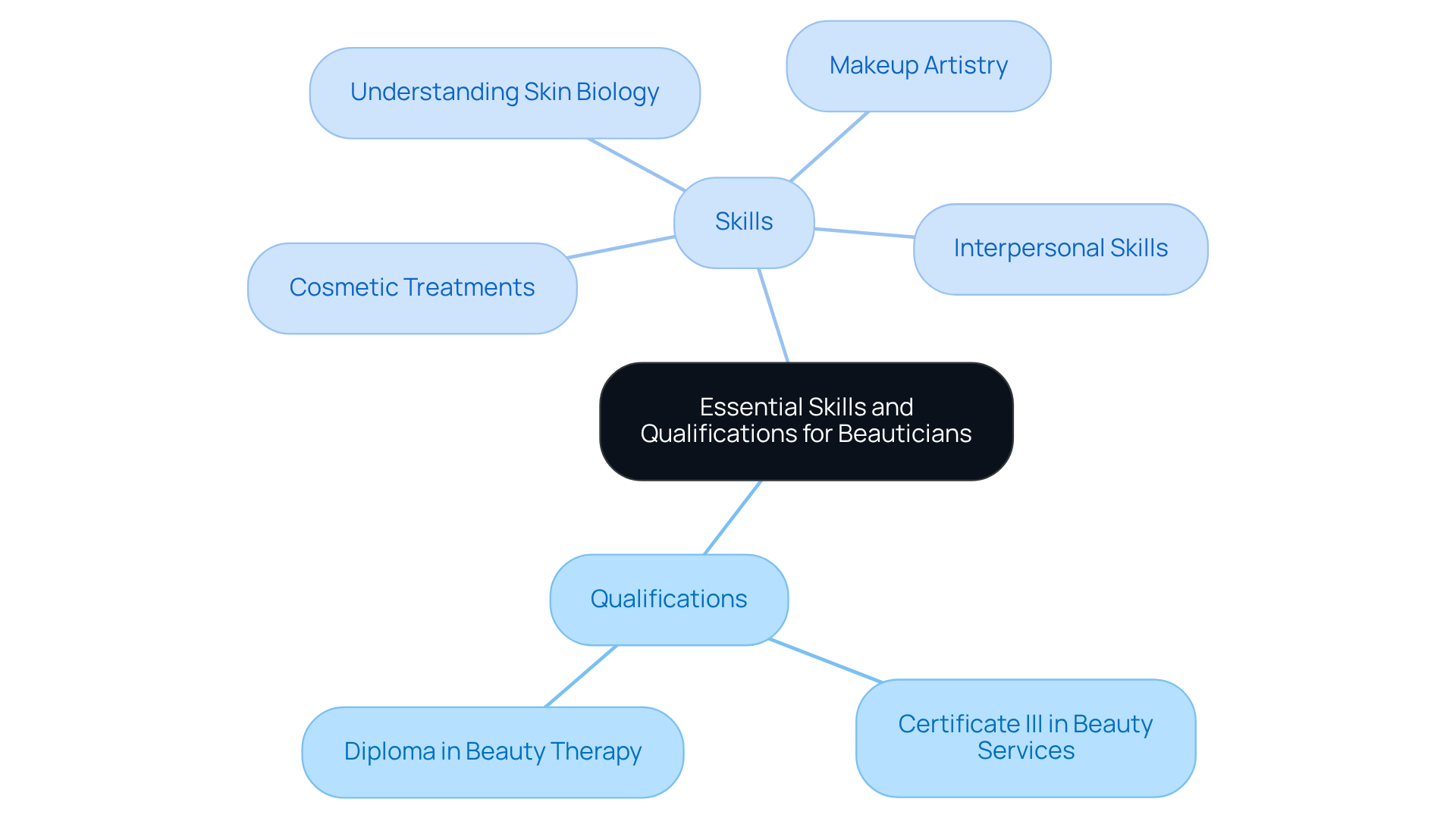Understanding the Beautician: Role, Skills, and Career Paths

Overview
The article delves into the pivotal role of beauticians, underscoring their responsibilities in delivering cosmetic services that not only enhance clients' physical appearance but also bolster their emotional well-being.
Formal training is not just important; it is essential for equipping beauticians with the skills necessary to thrive in a competitive market.
The diverse career paths available within this industry illustrate how beauticians significantly contribute to individual self-esteem and the expanding cosmetics market.
As the demand for beauty services continues to rise, it is imperative for aspiring beauticians to pursue formal education and training.
This investment in their professional development will ultimately lead to greater opportunities and success in their careers.
Introduction
The realm of beauty transcends mere aesthetics; it wields a profound impact on individuals' self-esteem and emotional well-being. Beauticians, often regarded as the architects of confidence, provide a diverse array of services that not only elevate physical appearance but also foster psychological health.
As the beauty industry undergoes significant evolution, with projections indicating remarkable growth and diversification, a crucial question emerges: what does it truly take to excel as a beautician in this dynamic landscape?
This article explores the roles, essential skills, and varied career paths available, illuminating the multifaceted profession of beauty while shedding light on the opportunities and challenges that lie ahead.
Define the Role of a Beautician
A cosmetologist, or aesthetician, is a skilled expert dedicated to delivering a range of cosmetic services that enhance individuals' physical appearance and support their overall well-being. Their responsibilities encompass hairstyling, makeup application, skincare procedures, and various cosmetic therapies, including facials, waxing, and nail care. The beautician engages in discussions with clients to assess their unique needs, recommend suitable treatments, and provide guidance on skincare and cosmetic products. This role is crucial in the cosmetics sector, as the beautician not only helps individuals look their best but also significantly contributes to enhancing their self-esteem and confidence.
The impact of the beautician extends beyond mere appearance; they play a vital role in improving individuals' emotional well-being. For example, aesthetic therapy sessions in care homes have been shown to uplift residents' moods and boost their self-worth, as highlighted by care manager Karen Davies. Regular grooming procedures foster a sense of community and belonging, particularly among older adults who may feel overlooked by society. This emotional connection is further illustrated by beauty expert Kelly Anthony, who emphasizes the transformative effects of beauty therapy on her clients, including those with dementia, underlining the importance of touch and personal interaction.
At Tsavo Wellness, the transformative experiences shared by patrons underscore the significant influence that the beautician has on self-esteem and confidence. Clients report that treatments such as lymphatic massage and infrared sauna sessions not only rejuvenate their bodies but also provide a serene sanctuary that enhances their overall well-being. As one patron noted, the welcoming atmosphere and attentive service create a space where they can escape daily stressors and feel valued. Industry leaders recognize this impact, with Kelly Anthony stating, "Beauty therapy is about making residents feel special and valued, not just about appearance."
Furthermore, the cosmetics sector is projected to reach US$7.42 billion in 2024, with 41% of Australians spending a total of $19.7 billion annually on their appearance. This trend highlights the in improving physical appearance while also nurturing the emotional and psychological well-being of their clients. Additionally, skilled cosmetologists can earn between $65,000 and $75,000 annually, emphasizing the profession's economic significance.

Identify Essential Skills and Qualifications
To excel as the beautician, individuals must typically complete formal training, such as a or a Diploma in Beauty Therapy. These qualifications equip them with essential skills, including proficiency in various cosmetic treatments, a solid understanding of skin biology, and the ability to perform makeup artistry. Strong interpersonal abilities, particularly in communication and customer service, are crucial for establishing rapport with clients. As the cosmetics industry evolves, staying abreast of the latest trends and techniques is vital, often necessitating continuous education and professional development.
For instance, aesthetic professionals engaged in ongoing education are more likely to remain in high demand, as they can adapt to emerging trends and shifting client preferences. Statistics reveal that 9 out of 10 students secure employment offers before graduating from The French Beauty Academy, underscoring the significance of education in this field. Moreover, the beauty and wellness industry in Australia is projected to reach $8.6 billion by 2025, highlighting the expanding opportunities available. Anticipated trends such as gender-neutral services, wellness integration, and customized care will dominate the market in 2025, making flexibility imperative for beauty professionals.
The combination of technical expertise and soft skills is essential for delivering exceptional services and ensuring client satisfaction. Additionally, industry insights suggest that cosmetologists pursuing advanced qualifications, such as a Diploma of Beauty Therapy, can enhance their career prospects and specialize in areas like advanced skin procedures or makeup artistry. This showcases the diverse opportunities available in this dynamic field, encouraging aspiring beauticians to invest in their education and the growth of their professional skills.

Explore Career Paths and Specializations
Cosmetologists have a myriad of career paths and specializations to explore within the aesthetic industry. Common roles encompass:
- Makeup artist
- Skincare specialist
- Nail technician
- Hair stylist
Many cosmetologists opt to focus on specific procedures, such as:
For instance, the Skin Care Specialty program at TSPA Howell prepares graduates to meet the growing consumer demand for tailored skincare solutions, enabling them to work as licensed estheticians in diverse environments, including spas and dermatology clinics.
The aesthetics industry is experiencing a notable shift towards the incorporation of wellness practices into traditional services, a trend exemplified by the offerings at Tsavo Wellness. Their services emphasize cellular-level restoration and enhanced recovery, promoting health and vitality through advanced therapies such as lymphatic massage and red light therapy. This holistic approach not only elevates client experiences but also resonates with the increasing consumer preference for wellness-focused treatments.
Moreover, cosmetologists can uncover opportunities in a variety of settings, ranging from:
- Salons
- Spas
- Wellness centers
- Mobile aesthetic services
As the beauty industry continues to evolve, the rising trend of professionals upskilling in cosmetic nursing and injectables further underscores the exciting career options available. This moment presents an ideal opportunity for the beautician to explore innovative paths that align with their passions and the demands of modern consumers, particularly those seeking balance and renewal through .

Conclusion
The role of a beautician is multifaceted, extending beyond mere cosmetic services to encompass the enhancement of clients' emotional and psychological well-being. Beauticians are pivotal figures in the cosmetics industry, empowering individuals to look and feel their best, while fostering self-esteem and confidence. Their expertise in hairstyling, skincare, and diverse treatments underscores their significance in promoting overall wellness.
Key insights from the article reveal the essential skills and qualifications for aspiring beauticians, which include:
- Formal training
- Robust interpersonal abilities
The increasing demand for beauty services, projected to reach substantial economic milestones, underscores the necessity for continuous education and adaptability within the field. The variety of career paths available to beauticians—ranging from makeup artistry to holistic wellness practices—further illustrates the dynamic nature of this profession.
Ultimately, the beauty industry stands on the cusp of exciting transformations, propelled by shifting consumer preferences and a heightened focus on wellness. For those contemplating a career as a beautician, embracing ongoing education and exploring innovative specializations can lead to rewarding opportunities. The importance of beauticians transcends aesthetics; they play a vital role in enhancing the quality of life for their clients, rendering this profession not merely a career choice but a meaningful vocation.
Frequently Asked Questions
What is the role of a beautician?
A beautician, also known as a cosmetologist or aesthetician, is a skilled expert who provides a variety of cosmetic services that enhance physical appearance and support overall well-being. Their responsibilities include hairstyling, makeup application, skincare procedures, and cosmetic therapies such as facials, waxing, and nail care.
How do beauticians contribute to their clients' emotional well-being?
Beauticians play a vital role in improving clients' emotional well-being by uplifting their moods and boosting self-worth through aesthetic therapy sessions. Regular grooming procedures foster a sense of community and belonging, especially among older adults who may feel overlooked.
What are some specific services provided by beauticians?
Beauticians provide services including hairstyling, makeup application, skincare treatments, facials, waxing, nail care, and various cosmetic therapies.
How do beauticians assess and recommend treatments for clients?
Beauticians engage in discussions with clients to assess their unique needs, recommend suitable treatments, and provide guidance on skincare and cosmetic products.
What impact do beauticians have on clients with specific conditions, such as dementia?
Beauticians can have transformative effects on clients with conditions like dementia, emphasizing the importance of touch and personal interaction during beauty therapy, which can enhance their emotional connection and overall well-being.
What are the economic aspects of being a beautician?
Skilled cosmetologists can earn between $65,000 and $75,000 annually, highlighting the economic significance of the profession within the cosmetics sector.
What is the projected growth of the cosmetics sector?
The cosmetics sector is projected to reach US$7.42 billion in 2024, with a significant portion of Australians spending a total of $19.7 billion annually on their appearance.
How do beauticians create a positive experience for their clients?
Beauticians create a welcoming atmosphere and provide attentive service, allowing clients to escape daily stressors and feel valued, which enhances their overall well-being.


